|
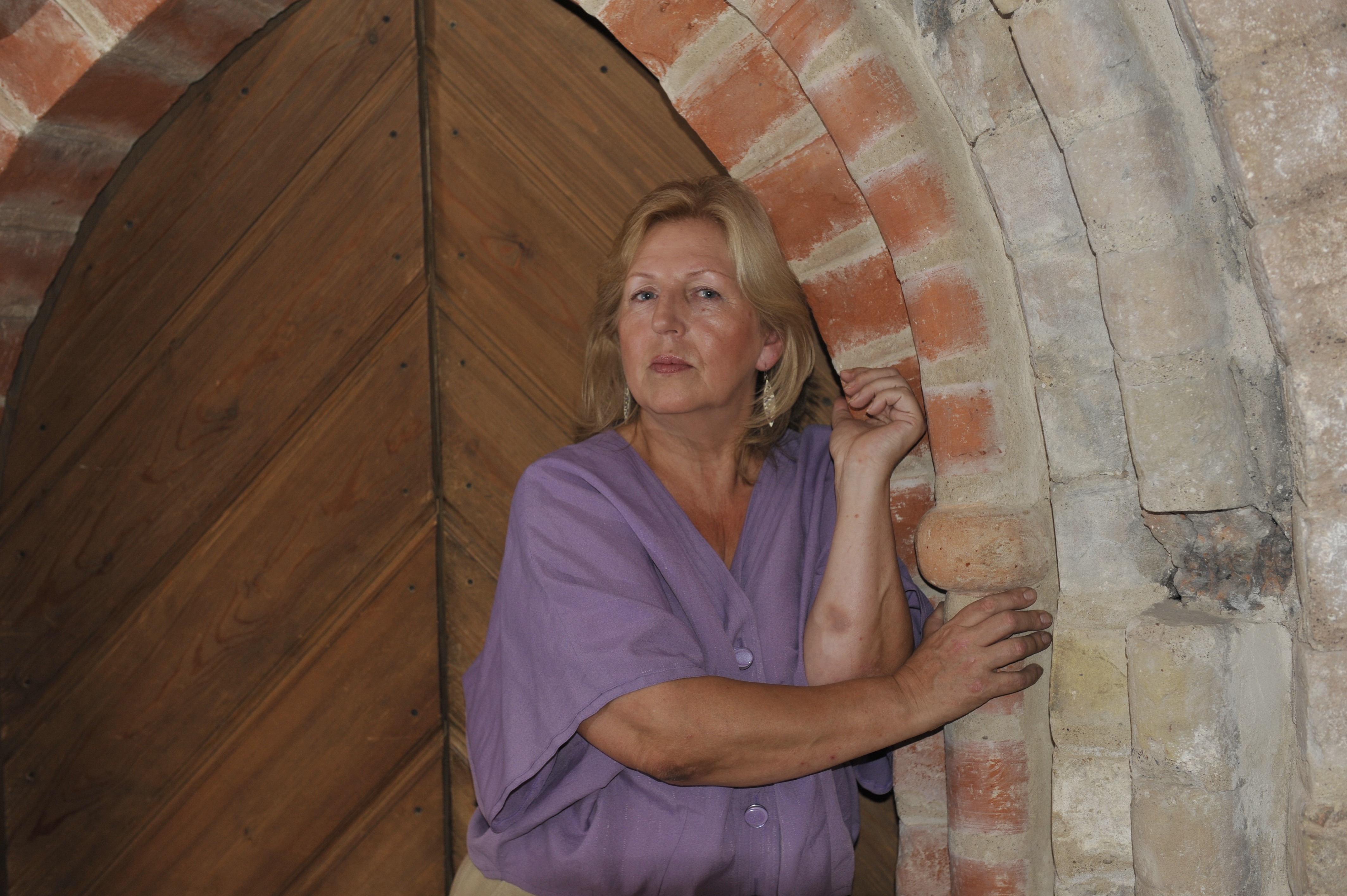
|
| Latvian Author Laimdota Sele |
Zinta for The Smoking Poet: Welcome, Laimdota! It’s a special thrill for me
to interview you—my Ventspils sister! Special, too, because this gives me an opportunity to let our readers know something
more about Latvia. Let’s begin by having you tell our readers something
about yourself. Where you were born, and if you could describe the world, your world,
around you at that time and as you grew up in Latvia.
Sveika, Laimdota! Tik ļoti priecājos
tevi intervēt, savu Ventspils māsiņu! Priecājos arī par šo izdevību iepazīstināt
TSP lasītājus ar Latviju. Iesāksim ar īsu biogrāfiju. Kur esi dzimusi, kādā pasaulē
iedzimi, ja būtu iespējams to aprakstīt tavos pirmajos gados.
Laimdota Sēle: Paldies, mīļo māsiņ, par iespēju šādā veidā uzrunāt
lielās un plašās US lasītāju. Esmu dzimusi, kā Tu jau zini, krievu okupētajā Latvijā
1951. gadā, tātad var teikt, ka manas dzimšanas laikā Latvija bija okupēta jau otro reizi (1940 un
1945). Tie bija bargie Staļina laiki, ko vēlāk mani vecāki un vecvecāki atcerējās ar šausmām
un bailēm. Mans tēvs, bijušais Latvijas nacionālais karavīrs, kurš „Kurzemes cietoksnī” cīnījās pret okupantiem līdz pēdējam, bija spiests mainīt uzvārdu, un mana
māte pašaizliedzīgi palīdzēja viņam vispirms slēpties, pēc tam uzsākt legālu
dzīvi. Viņam nācās strādāt primitīvu darbu, lai varas iestādes nepievērstu viņam
uzmanību, tāpēc mana bērnība pagāja diezgan lielā trūkumā. Taču man nebija
iespēju salīdzināt, jo citādus dzīves apstākļus nepazinu. Zināju, ka Amerikā
dzīvo mana vecmāmiņa un vectēvs (tēva vecāki), bet par to runāt nebija vēlams. Diemžēl
šos savus senčus es tā arī nekad neredzēju. Tomēr savu bērnību es nesauktu par nelaimīgu,
pirmkārt, tāpēc, kā jau minēju, man nebija iespēju salīdzināt, otrkārt, dzīvoju
savā pasaulē – mūsu vecajā mājā un dārzā, ko mums, par brīnumu, neatņēma,
ļoti daudz lasīju un... fantazēju.
Thank you, my dear sister, for
this opportunity to address the many readers of United States. I was born, as you know, during the years of Latvia’s
Russian occupation in 1951, so you could say that during the time of my birth, Latvia had been occupied for the second time
(1940 and 1945). Those were the brutal Stalin years that later my parents and grandparents recalled with horror and fear.
My father, who fought in the Latvian national army in the battle at the Kurzeme fortress against the occupants until the very
last, was forced to change his last name, and my self-sacrificing mother at first helped him to go into hiding, and after
that to resume a more or less legal life. He was forced to work in meaningless, low-paying jobs so that the occupying forces
would take no notice of him, and so my childhood passed in poverty. But I had
no standard of comparison, because I knew no other life. I knew that my paternal grandmother and grandfather lived in America,
but it was understood that one did not talk about such things. Unfortunately, I never had the opportunity to meet them. And
still, I would not call my childhood unhappy—first, because as I mentioned I had no point of comparison, and second,
because I lived in my own world—in my parents’ old house and yard, which, miracle that it was, was not taken away
from us, and I read a great deal … and I fantasized.
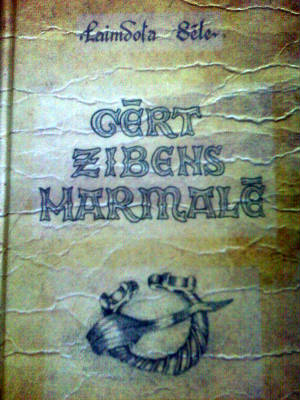
Zinta: How did you become a writer? How has your career as a journalist, as a writer, molded you and your life?
Kā kļuvi par rakstnieci? Kā
tava karjera kā žurnāliste, kā rakstniece, tevi un tavu dzīvi veidojusi?
Laimdota: Kopš 11–12
gadu vecuma mani ļoti interesēja vēsture, un to es izvēlējos par savu nākamo profesiju. Mācījos
Latvijas Universitātes Vēstures fakultātē neklātienē, taču augstskolu nepabeidzu... Nepabeidzu
tāpēc, ka nevarēju sevi piespiest apgūt (iekalt!) tik absurdus mācību priekšmetus kā
„marksisma ļeņinisma filosofija”, „zinātniskais komunisms”, „sociālisma
politekonomija” un tamlīdzīgus, bet tieši šajos priekšmetos bija jākārto valsts eksāmeni.
Nekad neesmu spējusi sevi piespiest melot un izlikties; kad vidusskolas laikā man LIKA iestāties komjaunatnē
(komunistu organizācija jaunatnei) es drīzāk biju gatava, lai mani izmet no skolas, nekā šādā
veidā pārdot savu dvēseli un apgānīt savu vecāku un vecvecāku ideālus. Mani sauca
par traku, tāpat arī manu aiziešanu no augstskolas priekšpēdējā kursa – par neprātu,
taču tāda spītniece nu reiz biju, un nekad neesmu to nožēlojusi. Strādāju dažādus
darbus – kādus gadus muzejā, tad šur tur par lietvedi, sekretāri, arī par mākslinieci
J pilsētas lielākajā kinoteātrī, bet 1985.
gadā man gluži nejauši piedāvāja darbu laikraksta redakcijā par žurnālisti. Tā
kā tad jau bija sākušās lielās pārmaiņas bijušajā PSRS („perestroika”
– pārbūve), es tur varēju strādāt, arī nebūdama komjaunatnē vai kompartijā,
rakstīju visvairāk par kultūras jautājumiem, pilsētas vēsturi, bet, sākoties Atmodai (1988)
– arī par politiskiem jautājumiem un pārmaiņām. Taču literatūrā pirmie soļi
bija jau agrāk, visvairāk dzeja, pirmās publikācijas bija 70. gadu vidū. Astoņdesmito gadu sākumā
pārdzīvoju ļoti spēcīgu emocionālo pacēlumu personiskajā dzīvē, kas mani
mudināja rakstīt daudz aktīvāk; šajā laikā sacerēju 2 lugas, iesāku savu pirmo
romānu „Spoguļa pārbaude”, un no šajā laikā uzrakstītajiem dzejoļiem iznāca
mana pirmā dzejas grāmata „Izšķilt mīlestību” (1989). Tolaik darbojos arī Ventspils
Vides aizsardzības klubā, ko varētu nosaukt par vienu no pirmajām pretpadomju organizācijām
Latvijā un kas, vēlāk iekļaujoties Latvijas Tautas frontē, palīdzēja novest Atmodas procesu
līdz valsts neatkarības atgūšanai. Tas atkal bija jauns stimuls rakstīt, rakstīt, celt gaismā
visas tās lietas, ko padomju okupācijas laikā vajadzēja slēpt un klusēt – Latvijas ĪSTO
vēsturi, brīvības cīņas 1918–1919, pirmās brīvvalsts laiku, Baigo gadu, dubulto –
krievu un vācu okupāciju utt. Kļuva pieejami daudzi avoti, kādu agrāk nebija. 1991. gada janvārī
arī es biju Rīgas barikāžu aizstāvju rindās; tur pārdzīvotais bija neaizmirstams...
Tūlīt pēc tam, kad 1994. gadā iznāca „Spoguļa pārbaude”, sāku strādāt
pie romāna „Mūsu mīlestības gadsimts”, kur barikāžu laika ainas mijās ar Latvijas
20. gs. svarīgāko notikumu epizodēm. Tikai pēc šī romāna iznākšanas sāku
sevi uzskatīt par rakstnieci...
Since I was 11 or 12 years old,
I have been very interested in history, and I wished to pursue it as my profession. I studied history at the University of
Latvia, but I did not graduate … I did not graduate because I was completely incapable of completing such absurd courses
such as Marxist Leninist Philosophy, Scientific Communism, the Political Economics of Socialism, and so on, but these were
the subjects in which a history major had to pass exams. I have never been able to force myself to lie and pretend; when during
high school I was FORCED to join the communist youth organization, I was ready to let myself be suspended from school rather
than to sell my soul and taint the ideals of my parents and grandparents. I was called crazy, as was my leaving the university
just prior to completing my degree, but I was stubborn and have never regretted it. I worked in all kinds of jobs—some
years in a museum, here and there as an accountant, a secretary, even as an actress in our city’s largest movie theatre,
but in 1985 I was coincidentally offered a position as a journalist at our city newspaper. Since the political movement of
“perestroika” (revival) had begun, I was allowed to work there without being a member of the communist party,
and I wrote most about cultural topics, city history, but, once the 1988 national rebirth movement began, even about politics
and political changes. My literary endeavors began earlier, however, mostly in poetry, with my first publication in the mid
‘70s. In the beginning of the ‘80s, I experienced a very powerful emotional upheaval, and that drove me to wrote
more actively; during this time, I wrote two plays, started my first novel, Spogula Parbaude (The Test of Mirrors), and from
the poetry written in this time, my first poetry collection, Izskilt Milestibu (1989), or The Birth of Love. At that time,
I also took part in greater Ventspils protection league, which you could call one of the original anti-Soviet organizations
in Latvia, and which, later joining the National Latvian Front, helped to bring the process of renewal to the conclusion of
regaining our independence. Once again, I was inspired to write, write, bring
into the light all that had been hidden and silenced during the Soviet years—the true history of Latvia, our freedom
fight of 1918-1919, our first independence, the year of horror (1940-1941), the dual occupation of Nazi Germany and Soviet
Russia, and so on. I could access materials that I could not access before. In January 1991, I also stood on the barricades
in Riga (when the Soviet occupation was overthrown), and what I experienced there was unforgettable… Immediately after that, when The Test of Mirrors was published, I started work on my novel, Musu Milestibas
Gadsimts (The Century of Our Love), where scenes from this time on the Riga barricades intertwined with scenes from the 20th
century in Latvia and our most historic events. Only after this novel was published did I begin to think of myself as a writer
…
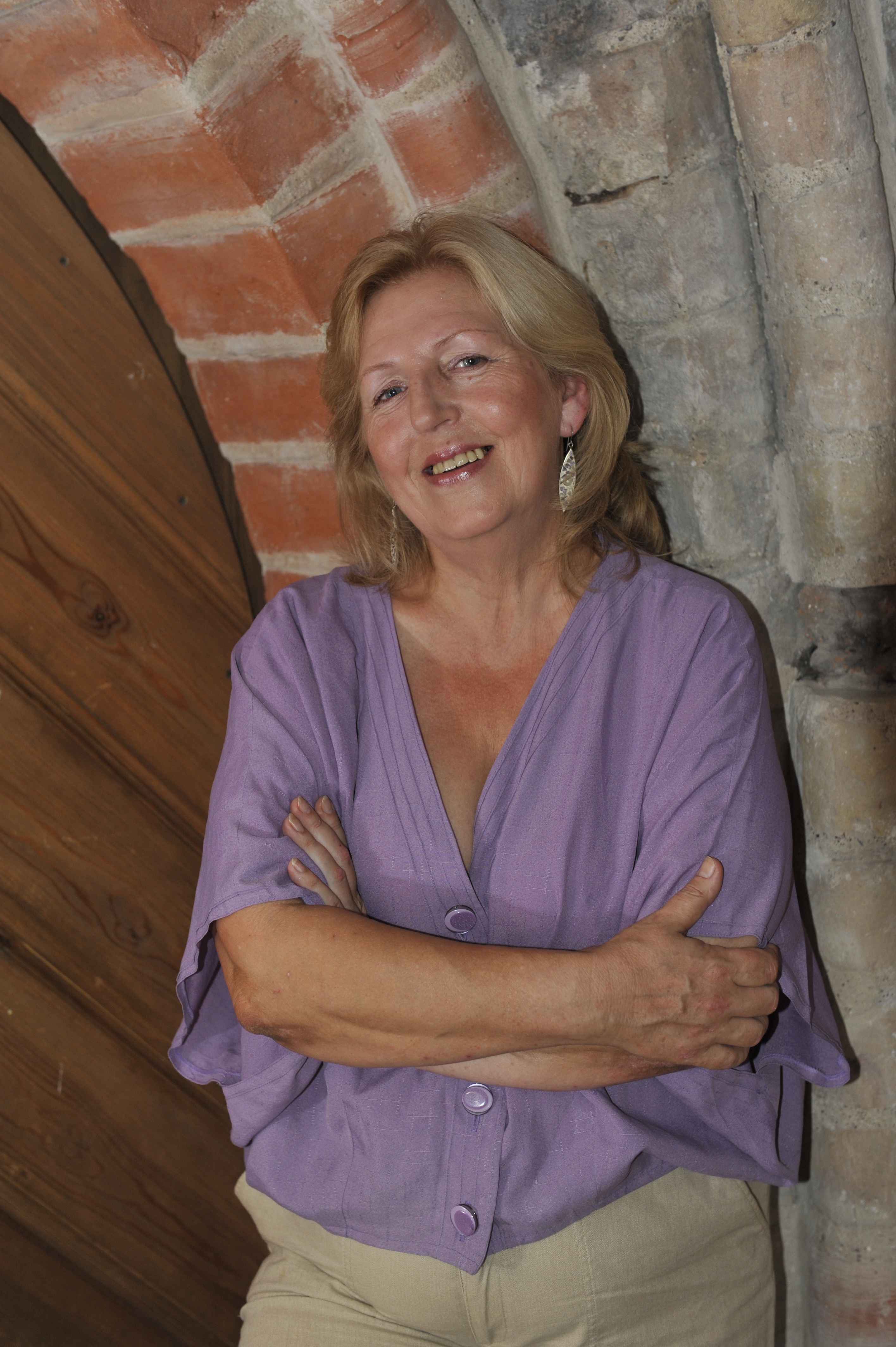
Zinta: In much of your work, and very much so in this newest novel, Cērt Zibens
Marmalē (Lightning Strikes The Sea), you delve into Latvian history, specifically into the history of Ventspils.
Why is it important to understand one’s history and the history of place? What have you learned about your home—and
yourself—through your historic research?
Daudzos tavos darbos, ieskaitot Cērt Zibens
Marmalē, tu raksti par vēsturi, specifiski Ventspils vēsturi. Kādēļ ir svarīgi pazīt
vēsturi, gan savu gan vietas vēsturi? Ko esi ieguvusi no šīs vēstures izpētes?
Laimdota: Kā jau teicu, vēsture ir mana lielākā interese, pat kaislība (neraugoties uz to, CIK
MAZ no šī priekšmeta izdevās apgūt padomju laika augstskolā); absolūti lielāko daļu
savu zināšanu esmu apguvusi pati, nemitīgi lasot, meklējot, mācoties. Ventspils ir mana pilsēta,
mana mīlestības zeme, tādēļ mani interesē ikviens tās vēstures mirklis – tāpat
kā mēs gribam uzzināt pēc iespējas vairāk par cilvēku, kuru mīlam no sirds. Diemžēl
daudz kas no manas pilsētas pagātnes ir zudis un nogrimis vēstures dziļākajās dzīlēs
– šeit pāri gājis tik daudz karu, tik daudz iekarotāju, kas ir laupījuši un dedzinājuši,
postījuši tīrā prieka pēc... tādēļ man šķiet tik svarīgi atjaunot kādu
no zudušajām lappusēm! Tas nav, kā saka, grābts no gaisa vai izperēts fantāzijā, bet
pamatots saglabājušajos avotos, arheoloģiskajos izrakumos (pati esmu piedalījusies) un meklēts analoģijās
ar līdzīgu (vietā un laikā) pilsētu rašanos. Zināt savas pilsētas un zemes vēsturi
manuprāt ir tikpat svarīgi kā zināt savu paša dzīves gājumu, taču šo domu var
paplašināt – jo vairāk zināms par pasaules vēsturi, jo vairāk uzzini par cilvēkiem,
kas tajā dzīvo. Vispār ir grūti nodalīt vēsturi un tagadni, jo viena izriet no otras.
As I said, history
is my greatest interest, even passion (in spite of how little I could learn about this topic during my Soviet school years);
in great part I gained my knowledge through independent study, constantly reading, seeking, researching. Ventspils is my city,
the city of my love, so every moment of her history interests me—just as we wish to know every detail about the one
we love with all our hearts. Alas, much of city’s history is lost and sunk into the deepest cracks of time—this
place has been ravaged by so many wars, so many armies, who have destroyed and burned, devastated for the sheer pleasure of
destruction … this is why it is so important to me to resurrect something of our lost pages! This isn’t, as one
might say, pulled out of thin air or imagined in fantasy, but carefully researched in archives, in archaeological finds (I
have participated in some of these digs) and compared to similar analogs (in place and time) in the birth of other cities.
To know the history of one’s city and country, in my opinion is as crucial as knowing one’s personal history,
and we can expand on this line of thought—the more we know about the world’s history, the more we understand the
people who live in it. It is difficult to separate history and the present, because one is born from the other.
Zinta: Tell us about your research. This novel has within it strikingly accurate representation of a time period, including
language, social interactions, customs, clothing and jewelry. How did you research for this novel and how much time did you
take on research before you began writing? Did you find anything that surprised you? Did you take artistic license in some
areas?
Pastāsti par saviem pētīšanas
darbiem. Šajā romānā tiek atspoguļots vēsturisks laikmets, valoda, sabiedriskie sakari, parašas,
apģērbi un rotas. Kā tu to visu spēji izpētīt un cik ilgi pavadīji pētniecības
darbos pirms sāki romānu rakstīt? Vai atradi kaut ko pārsteidzošu? Vai bija arī jāizmanto
māksliniecisku licenci, pašai savu iztēli?
Laimdota: Runājot par romānu
„Cērt zibens marmalē”, jāsaka, ka vēl nekad savā literārajā darbībā
nebiju ieskatījusies tik tālā pagātnē – 14. gs. otrajā pusē. Tas ir laiks, kad Ziemeļeiropā
un Viduseiropā strauji dibinājās un auga jaunas pilsētas, kad milzu ātrumā attīstījās
tirdznieciskie sakari starp Rietumiem un Ziemeļu, Austrumu zemēm. Tagadējās Latvijas teritorija tolaik
bija Livonijas garīgā ordeņa valsts sastāvdaļa; vietējā vidē ienāca kristīgā
ticība, Rietumeiropas modeļa pilsētnieku dzīvesveids un Rietumu preces. Ventspils pilsēta ar ostu,
dibināta 14. gs. 60 gados, bija Hanzas tirdzniecības savienības locekle; svarīgu tirdzniecības ceļu
krustpunkts. Es pūlējos iztēloties, kā nelielā teritorijā saskaras un sadzīvo trīs
tik atšķirīgas grupas kā Livonijas ordeņa bruņinieki (dižcilši un karavīri),
pilsētnieki (tirgotāji, amatnieki, kuģinieki) un vietējie
pirmiedzīvotāji – Kursas turīgie un lepnie ļaudis. Par viņu materiālo pasauli var spriest
pēc arheoloģijas atradumiem – tur ir gan apģērbu fragmenti un rotas, gan ieroči un darbarīki,
protams, ir arī apraksti senos rakstītos avotos – no turienes zinu par Kurzemes izcilajiem zirgiem, par medību
piekūniem utt. Ordeņa pils, kā zini, joprojām stāv; tā ir ļoti daudz pētīta līdz
pat būves pirmsākumiem 13. gs.. Visgrūtāk bija ar valodu, jo neuzskatīju par iespējamu likt
bruņiniekiem vai senajiem kuršiem runāt tipiskā „mūsdienu valodā”; seno vārdu
meklējumi paņēma vairākus gadus. Izklāsts par to būtu pārāk garš, tomēr
varu droši teikt – šie vārdi ir autentiski! To atzīst pat akadēmiski baltu filologi. Diemžēl
šī iemesla dēļ šaubos, vai manu romānu iespējams pārtulkot jebkurā citā
valodā – tulkotājam būtu jāmeklē ļoti sena slāņa vārdi savā valodā...
ja tas vispār iespējams.
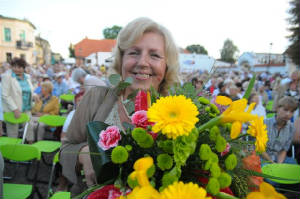
Speaking of my novel
Cert Zibens Marmale (Lightning Strikes the Sea), I would have to say, never before in my literary career had I looked
so far back in history—into the second half of the 14th century. That was a time when in northern and mid
Europe many new cities were established and flourishing, when trade routes were being developed at an incredible pace between
west and north and eastern countries. Today’s territory of Latvia was then a part of the Livonian order; in that midsection
entered Christianity, western European style civilization and western goods. Ventspils was a city with a port, established
in the 14th century at around the 60s, and was a member of the Hanseatic merchants league; an important trade center.
I attempted to imagine how three such different groups might relate to one another in such a small territory—the Livonian
knights order (the royals and the military), the city residents (merchants, craftsmen, and sailors) and the original inhabitants,
the proud and well-to-do people of Kursa. One can ascertain something about their material wealth from archeological finds—there
are fragments of wardrobes and jewelry, weapons and tools, and of course some written descriptions—from this I learned
about the great horses of Kurzeme and the hunting exhibitions, and so on. The ancient legion’s castle, as you know,
still stands; it has been greatly studied all the way back to the 13th century. Most challenging was to research
the language, because I didn’t consider it to be accurate to use today’s typical speech for the ancient knights
and Kursa peoples; to research the language of that day took several years. I won’t go into detail on that research,
but can affirm—the language of the novel is authentic! Even the linguistic experts confirm this. Unfortunately, for
this reason alone it is probably impossible to translate this novel—translators would have to research comparable ancient
languages of their own. If such a thing were even possible.
Zinta: What would you like to see Latvians learn from our history? Or, for that matter, anyone of any nationality from history?
Ko vēlies lai latvieši saprot
un mācās paši no savas vēstures? Un vispār, ko cilvēcei vajadzētu saprast no savas vēstures?
Laimdota: Es vēlētos,
lai vairums manu tautiešu vienreiz izmestu no galvas šo „bāreņu sindromu” un beigtu uzskatīt
savus senčus par mūžīgi apspiestajiem, pazemotajiem, nomāktajiem ļautiņiem, kas to vien
darījuši, kā kalpojuši svešiem kungiem paaudžu paaudzēs, un beigtu vaidēt par 700
gadu vergu jūgu. Visi jaunākie pētījumi, īpaši arheoloģiskie, liecina, ka līdz pat
16. gadsimta beigām mūsu senči dzīvojuši visai turīgi, pat bagāti, ja reiz izrakumos atrod
sudraba un pat zelta priekšmetus, bet par verdzībai līdzīgu pakļautību var būt runa, tikai
sākot ar Latvijas teritorijas iekļaušanu Krievijas impērijā politisku intrigu dēļ, un šis
process noslēdzās 1795.g. Taču nepagāja ne simts gadu, kad sākās tautas garīgā atmoda,
strauja kultūras un materiālās dzīves attīstība, nacionālās pašapziņas veidošanās,
kas noveda pie neatkarīgas Latvijas valsts dibināšanas 1918.g. Domāju, ka tikai savai vēstures mācībai
mēs varam pateikties par to, ka izturējām 50 padomju okupācijas gadus, nepazaudējām sevi un
atjaunojām savu valsti. Kāpēc cilvēcei vispār svarīgi zināt savu vēsturi? Lai neatkārtotu
kļūdas, kas kādreiz pieļautas, lai nepadotos grūtos brīžos un nenolaistu rokas briesmu
priekšā, un nezaudētu to, ko izcīnījuši priekšteči.
My wish is that my
people would once and for all abandon this notion of our being some kind of orphans, and to stop looking at our ancestors
as forever oppressed and humiliated and suppressed folk, whose only purpose was to serve their foreign rulers generation after
generation, to stop whining about this 700-year yoke. All the most recent research shows, especially the archaeological digs,
that until the end of the 16th century, our ancestors lived a very wealthy lifestyle, as we find much silver and
gold artifacts, but as for slavery, we find it begins only at the beginning of the Russian Empire, and this ended in 1795.
Not even a century went by that our renaissance began again, a steep curve of cultural expansion and material wellbeing, and
a sense of national identity that led us to declare our Latvian independence in 1918. I think it is only because we learned
from our history that we can be grateful for our ability to endure 50 years of Soviet occupation, that we did not lose ourselves
and were able to renew our nation. Why else is it important for a nation to know its own history? But to not repeat our mistakes,
that once we tolerated, and to not succumb to difficult times and not surrender in the face of threats, and to not lose that
for which our ancestors fought.
Zinta: In large part, your novel is also a very touching story of romance between two people of different backgrounds. Tomass
is a young man who is still untested by life when he meets Ralda, a proud and beautiful young woman who lives in early Ventspils.
Tell us about how you developed these characters, how you chose them to be who they are—and how they may differ from
a young couple today. Ralda, for instance, is something of a feminist …
Tavā romānā parādās
arī aizkustinošs mīlestības stāsts starp diviem jauniešiem no atšķirīgām
pasaulēm. Tomass ir vēl jauns, dzīves nepārbaudīts puisis, kad satiek Raldu, cēlu skaistuli
senlaiku Ventspilī. Pastāsti, kā attīstīji un izveidoji šos divus jauniešus un kā
viņi varbūt atšķiras no šodienas pāriem. Ralda, piemēram, pārstāv sieviešu
tiesības…
Laimdota: Tu saki „something
of a feminist”... hahaha! Nē, tā laikam nebūs vis. Šī meitene par sieviešu tiesībām
neko nezināja un nevarēja zināt. Ir tā, ka 14. gs. Rietumeiropā valdīja kristīgās
baznīcas fanātiķu un sholastu uzskati, ka sieviete ir viltīga, netīra, nelabām kaislībām
pakļauta būtne, kas to tik domā, kā pazudināt labos, tiklos un godīgos vīrusJ, tāpēc tai jāstāv klusu, jāslēpj
miesa, mati, rokas, kājas, mudīgi jāapprecas vai jāiet klosterī. Turpretī Kursā (Kurzemē),
atskaitot kristīšanu un vēl šo to, kūru vidū valdīja agrākās paražas; meitenes
kopš bērnības mācīja jāt, rīkoties ar ieročiem, un, kā rakstīts hronikās,
kaujās viņas cīnījās kopā ar vīriem. Bizes nepina, matus nēsāja vaļējus
„kā raganas”, valkāja pietiekami īsus svārkus, lai varētu jāt zirgā un parādīt
savas smukās sietavas (kājautus)J... Ne velti Tomass, Raldu
ieraudzījis, ir šokā! Taču mīlestība, kā zināms, palīdz saprast pat nesaprotamo
bez noraidījuma vai sašutuma. Tieši šī divu dažādu kultūru un dzīvesveidu sadursme
man likās interesanta, tāpēc arī šie mīlētāji ir tādi. Man liekas, ka viņi
diez vai ļoti atšķiras no mūsdienu pāriem, kur katrs nāk no savas tautas, kultūras un pat
ticības... Varbūt pirms 100 gadiem tā būtu uzskatīta par mezaliansi, bet laikmetos, kad pasaule pārveidojas
(un tāds ir arī tagad), tā ir parasta lieta.
You say, something
of a feminist … ha! No, not really. This young woman knew nothing about women’s rights and couldn’t know.
In the 14th century, the dominant thought in Western Europe among Christian fanatics and scholars was that woman
is evil, unclean, a creature ruled by dark passions, whose only thought is how to seduce the good and honorable men and ensnare
them in her wiles, and so she should be silent, must hide her flesh, her hair, hands, feet, wed quickly or enter the cloister.
On the other hand, in Kurzeme, with the exception of the Christians and a few
others, earlier traditions held among the residents; girls were taught early to ride horses, how to handle weapons, and, as
it was written in chronicles, they fought alongside the men folk in battle. They did not braid their hair, but allowed their
hair to flow freely “like witches,” and wore skirts short enough to allow them to ride horses and show off their
pretty stockings … it’s understandable that Tomass, seeing Ralda, was in shock! But such is love, that it allows
one to understand without judgment or disdain. It was precisely this convergence of cultures and lifestyles that so fascinated
me, so I wrote about these lovers. They no doubt are not so very different from contemporary couples, where each may come
from a different ethnic background or culture or religion … Perhaps before 100 years this was considered scandalous,
but in transitional times, as the world changes, as now, this is quite common.
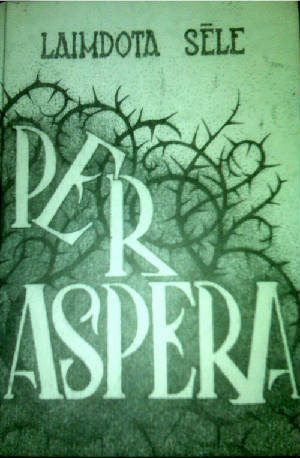
Zinta: A wonderful addition to this novel are the beautiful illustrations. The illustrator, Ansis Sēlis-Sviriŋš,
is your son. What was it like to work with your son on illustrating the book? Did you tell him what you envisioned? Or did
you simply give him the manuscript and let him loose? Have the two of you collaborated in this way before or is Cērt Zibens Marmalē a first mother-son collaboration?
Romānu skaisti ilustrējis Ansis
Sēlis-Sviriņš, tavs dēls. Pastāsti par šo sadarbību ar savu dēlu. Vai tev bija viņam
jāizstāsta, kā biji iztēlojusies gatavo grāmatu? Vai varēji tāpat iedot viņam manuskriptu
un ļaut viņam pašam to iztēloties? Vai šī jums ir pirmā tāda sadarbošanās?
Laimdota: Nē, šī nav pirmā. Mūsu pirmā
tāda veida radošā sadarbība izpaudās manā dzeju grāmatā „Per aspera”,
kas iznāca pirms diviem gadiem. Runājot par šo romānu, liela nozīme ir tam, ka arī Ansis ļoti
aizraujas ar vēsturi un ir piedalījies vairākos ar eksperimentālo arheoloģiju saistītos projektos,
it īpaši kas attiecas uz bruņniecību un seno cīņu
mākslu. Tāpēc viņš ir ne vien grāmatas mākslinieks, bet arī mans konsultants specifiskos
ar 14. gadsimta ieročiem un bruņām saistītos jautājumos. Es nekādā veidā neietekmēju
viņa radošo procesu, un pēc izlasītā manuskripta viņš pats piedāvāja šādu
koncepciju – veidot ilustrācijas kā gotiskus logus, caur kuriem lasītājs it kā var ieskatīties
viduslaiku dzīves ainās.
No, this is not the
first. Our first such collaboration was with my poetry book, Per Aspera, published two years ago. Speaking of this novel,
it is meaningful that Ansis is equally fascinated by history and has taken part in various experimental archaeological projects,
especially those involving knights and medieval jousting. For that reason, he was not only the illustrator for this book,
but also my consultant, specifically on topics of 14th century weaponry and knights. I did not otherwise influence
him in any manner in his creative process, and once he had read the manuscript, he presented this concept—to create
the illustrations to look like Gothic windows, through which the reader could peer onto scenes of medieval life.
Zinta: Are there any plans to translate this novel in other languages? Have any of your other works been translated?
Vai ir kādi tulkojumi padomā?
Vai kādas no tavām grāmatām ir jau tulkotas citās valodās?
Laimdota: Diemžēl nav. Interesei tulkot kādu darbu jānāk no „pretējās puses”;
pagaidām vienīgie manu darbu tulkojumi (daži fragmenti no „Mūsu mīlestības gadsimts”
un kāds desmits dzejoļu) ir krievu valodā; tos tulkoja mana paziņa Ventspils krievu rakstniece Tatjana
Liepiņa.
Unfortunately not. The interest to translate
a work must come from the translator; for now, the only translations of my work (a few fragments of Musu Milestibas Gadsimts
and a few dozen poems) is into the Russian language; those were translated by Ventspils Russian author Tatjana Liepiŋa.
Zinta: The novel ends with something of a cliffhanger, at very least a hint of more story to come … any plans for
writing Part 2?
Romāns nobeidzas ar iespēju
stāstam turpināties. Vai ir kāds nodoms rakstīt turpinājumu?
Laimdota: Nē, tāda nodoma man nav. Lai stāsts turpinās lasītāju iztēlē...
No, I have no such plans. May the story
continue in the imagination of the reader …
Zinta: The book was unveiled in a historic location in Ventspils, a recently renovated castle. Tell us about that evening
(and oh, I wish I could have been there!)…
Grāmatu atklāja ļoti vēsturiskā
apkārtnē, vecajā Ventspils pilī, nesen atjaunotā. Pastāsti, lūdzu, par šo vakaru (tik
ļoti būtu vēlējusies tur klāt būt!) …
Laimdota: Tiešām, grāmatas atvēršanas svētki notika tai pašā Livonijas ordeņpilī,
kur risinās daļa romāna darbības – savā ziņā unikāls gadījums. To uzsvēra
arī Ventspils muzeja speciālisti (muzejs uz pili pārcēlās pirms gandrīz 10 gadiem, kad pabeidza
lielākās daļas telpu restaurāciju), sakot, ka, atšķirot šo grāmatu, var burtiski izstaigāt
tās pašas gaitas, ko gājuši grāmatas varoņi – komtūrs, bruņinieki, Ralda un
Tomass. Rīkotāji iesaistīja aktierus 14. gs. tērpos, lielajā pavardā dega uguns, smaržoja
zālītes; aktieri lasīja fragmentus... tas bija brīnišķīgi, mani aizkustināja līdz
sirds dziļumiem.
Indeed, the reception for the novel took place
in the Livonian castle, where much of the novel’s story unfolds—a rather unique opportunity. That was brought
up by the Ventspils museum curators (the museum moved to the castle about 10 years ago, when most of the rooms had been restored),
saying that, opening the book, one can literally retrace the steps of the book’s heroes—the commander of the knights,
and the knights, Ralda and Tomass. The organizers of the event had arranged for actors to be dressed in 14th century
apparel, and a fire blazed in the fireplace, the air was scented with ancient grasses, and the actors read fragments from
the novel … it was all so wonderful, I was moved to the depths of my heart.
Zinta: You are not only a novelist, but also a poet, very accomplished in both genres. When and how do you feel yourself
get pulled to write poetry and when prose? Do you sometimes “take a break” from working on a novel to write a
poem, just because that kind of mood strikes you? Or do you work just on a novel at some point, and then, when that is finished,
turn to writing a book of poetry? Do you express yourself differently in poetry than in prose?
Raksti ne tikai romānus, bet arī
dzeju, un esi ieguvusi panākumus abos žanros. Kad un kā juti sevī dzejas balsi un kad prozu? Vai reizēm
rakstot romānu raksti ari dzeju, jeb nododies tikai vienam vai otram pēc kārtas? Vai izsakies citādi dzejā
nekā prozā?
Laimdota: Par tām balsīm grūti izskaidrot. Rakstīt romānu
man nozīmē nepārtrauktu atrašanos tajā pasaulē, kādu nu kuru reizi esmu uzbūrusi.
Pat tad, kad fiziski nesēžu pie datora un neveidoju rindas, tās tikšķ manā galvā... tur
visu laiku kaut kas notiek, veidojas epizodes, risinās dialogi, uzplaiksnī kāds spilgts salīdzinājums
vai metafora... lūk, tagad Tev to saku un nodomāju – ak, vai, tas taču izklausās pēc šizofrēnijasJ... Taču tā ir – romāna rakstīšana
ir nepārtraukts radošs process kādā konkrētā vidē vai laiktelpā. Turpretī dzeja
uzrodas vienā mirklī! Izšaujas no nekurienes un ielec manī, tad nu ātri jāmanās pierakstīt.
Ja tas neizdodas, dažkārt pat labs dzejolis pazūd tajā pašā nekurienē, un nekad nepiedzimst.
Par izteikšanos pašai spriest grūti, var jau būt, ka arī manos romānos dažkārt ir
visai dzejiskas rindas.
It is difficult to explain those voices. To write
a novel means that I must live in that world at all times, that world that I have created. Even when I am not sitting at my
computer putting together sentences, it ticks away in my mind … something is constantly going on there, episodes taking
shape, dialogues developing, a metaphor might suddenly spark … see, even as I describe this, it sounds a bit schizophrenic
… but that’s how it is, writing a novel is a constant and uninterrupted process in space and time. On the other
hand, poetry is born in a moment! It springs from nowhere and jumps into me, so that I have to quick write it down. If that
isn’t possible, a good poem may vanish into nothing and never be born. It is hard for me to determine my own style of
expression; it could well be that poetic lines find their way into my prose, too.
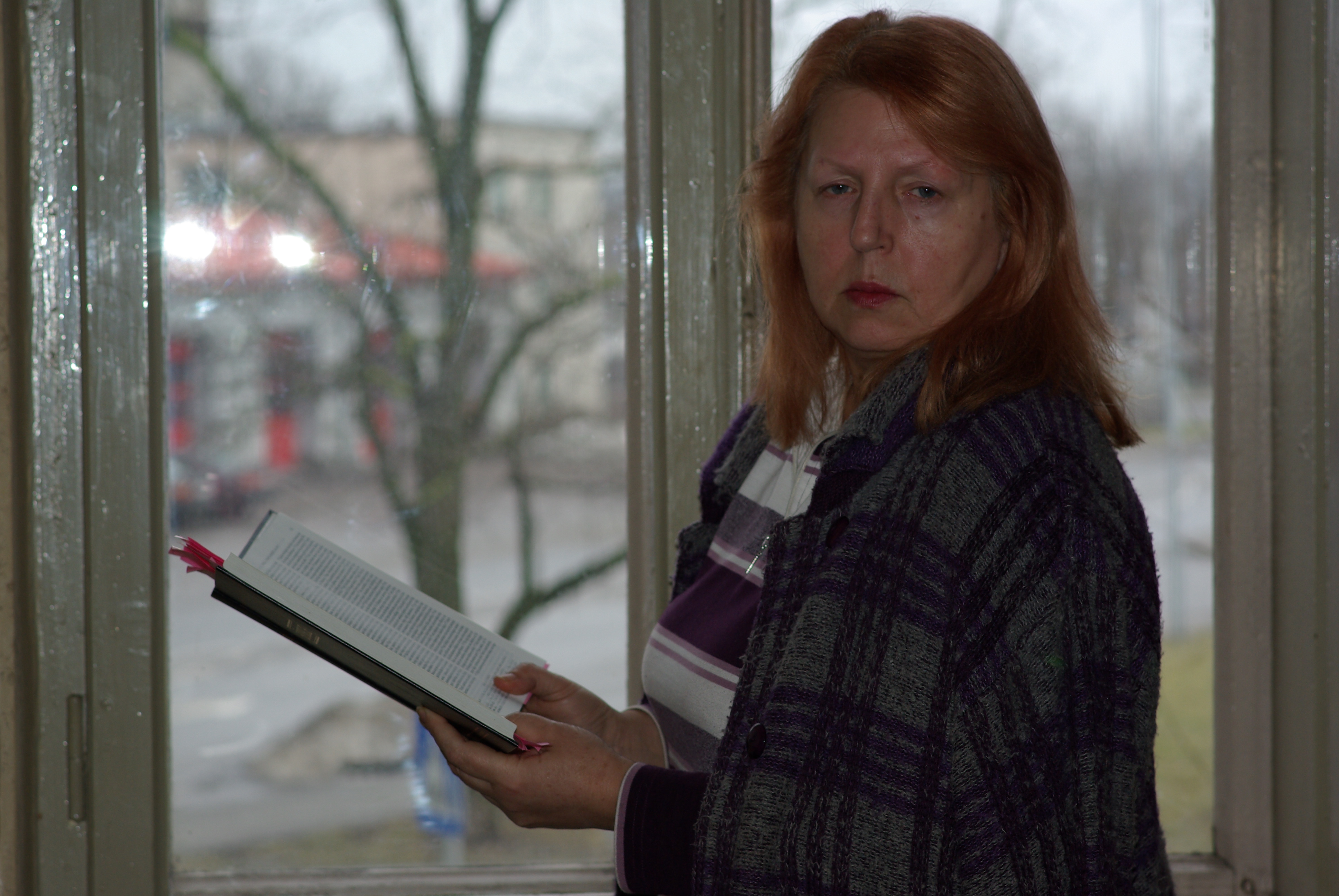
Zinta: Every artist of whatever medium surely feels that our creative works are something like our creative children and
loves them all equally if differently. Are some of your works more special to you than others? Have you written your masterpiece
yet or is that still ahead of you?
Katram māksliniekam nešauboties
savi mākslas darbi kļūst gandrīz kā paša bērni. Vai tev daži tavi “bērni”
sirdij tuvāki par citiem? Vai esi sasniegusi savu kalna galu literatūrā vai tas vēl tevi sagaida?
Laimdota: Jā, tā ir. Es savus darbus tiešām jūtu kā savus bērnus. Un, tāpat kā
nevar pateikt, kurš īstais, dzīvais bērns mātei vismīļākais, to nevar teikt arī
par darbiem. Vai varbūt tā – mīļākais ir tas, kurš pašlaik tiek iznēsāts,
resp., tas, ko patlaban rakstu. Tas vēl ir manī kā nepiedzimis mazulis, tas aug, veidojas, iegūst savu
seju, locekļus, raksturu, kamēr pienāk lielais – prieka un skumju asarām slacītais brīdis,
kad pielieku pēdējo punktu un nospiežu Ctrl+S... Viss! Viņš ir nācis pasaulē... bet man
ir jāpamet pašas radītā, iemīlētā un izsāpētā pasaule... Par kalna galu...
ak, vai! Ceru, ka nē! Mani literārie plāni ir tik lieli... kā Amerika!
That’s true. I really do feel that
my art is like my child. And just as no mother can call any of her children her favorite, neither can I choose a favorite
from among my work. Or maybe I could say—the dearest to me is the one I carry inside me now, in other words, the work
I am creating now. It is still my unborn child, growing, developing, forming a face, limbs, character, until that joyous and
simultaneously tear-washed moment, when I add the final period and … finished! He is born … but I must leave behind
my own creation, a world much loved and birthed with great effort … About a masterpiece… oh dear! I hope not!
My literary plans are still so ambitious … as big as America!
Zinta: You’ve experienced very different times in your life in terms of free speech. How has life changed for a writer
during the Soviet years and today? What are the creative challenges for Latvians today?
Esi piedzīvojusi ļoti atšķirīgus
laikus literatūras brīvā izteiksmē. Kā mainījušies rakstniekam apstākļi salīdzinot
padomju laikus ar šodienu? Kādi radoši izaicinājumi ir latviešiem šodien?
Laimdota: Varu pateikt to, ka padomju laikos man nebūtu nodrukāta ne rindiņa! Dzeju jau iespieda gan,
taču tā bija apolitiska, mīlestība u.t.t. Tajos gados cenzūra strādāja ne pa jokam, pietika
ar mazu nieciņu, lai vai nu darbu noraidītu, vai pašu autoru ieliktu melnajā sarakstā. Varēja
jau prostituēt savu talantu un rakstīt okupācijas varai pa prātam, slavināt komunismu un nozākāt
visus, kas to neslavina... arī tādu autoru pietika, un viņi dzīvoja ļoti labi, saņēma pat
„apbalvojumus”... nezinu, kā viņi šodien, ar kādām jūtām ieskatās savos
agrāk rakstītos darbos. Mūsdienās raksta daudz, autori ir dažādi, tāpat viņu darbi,
ir milzīgas izvēles iespējas lasītājam.
I can say this, that during the Soviet
years not one sentence I’ve written would ever have been published! Poetry, yes, that was published, but it was apolitical,
about love and such. In those years, censure was no small matter, it was enough to include some tiny detail and the entire
work would be dismissed, or the author blacklisted. One could prostitute one’s talent and write to please the occupiers,
praise communism and slander all who do not praise it … there were enough of those authors, too, and they lived very
well, even received “awards… I can’t imagine how they look upon their work today. Today much is written,
authors are diverse, just as their work is, and readers have a wide range of choices.
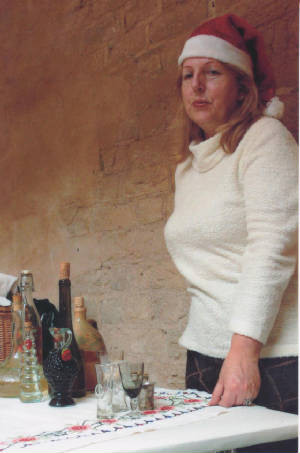
Zinta: You’ve recently learned to read and speak English, and the story of how that came to be is quite interesting
… and involves a little Muggle magic … please share that story with us.
What other languages do you speak?
Nesen esi iemācījusies angliski
gan lasīt gan runāt, un stāsts, kā to panāci, ļoti saistošs … un tajā ietilpst
mazliet arī Muggle burvība… lūdzu pastāsti mums par to. Kādas valodas vēl runā?
Laimdota: Tas patiešām
ir ērmīgs un jautrs stāsts! Skolā savulaik bez dzimtās mācījos krievu un vācu valodas.
Zināmās politikas dēļ krievu valoda noteikti nebija mans mīļākais priekšmets, tomēr
esmu to apguvusi perfekti un nenožēloju, jo ir ļoti daudz vērtīgu grāmatu, kas nav tulkotas
latviski, bet brīvi pieejamas krievu tulkojumos. Labi zinu arī vācu valodu, tulkoju daiļliteratūru
no vācu valodas latviski. Sarunu līmenī jau pirms daudziem gadiem apguvu franču valodu, taču angļu
valoda joprojām palika „aiz deviņiem zieģeļiem”. Pēc Latvijas neatkarības atgūšanas
angļu valoda sāka aizvien vairāk ienākt manā ikdienā, sākot jau ar visiem computer terminiem,
kam taču vajadzēja izlauzties cauri! Tomēr mans īstais angļu valodas skolotājs ir – ak,
vai kā lasītājs smiesies! – Harry Potter... Notika tā, ka 2001. gadā, kad latviešu valodā
iznāca HP pirmā grāmata, es un mana ģimene, kā arī daudzi mūsu draugi neatkarīgi no
vecuma pēkšņi kļuvām par Roulingas burvju pasaules faniem. Tā nu, nespējot sagaidīt
kārtējās latviski tulkotās grāmatas iznākšanu un zinot, ka dēla draugs pasūtījis
un saņēmis kāroto grāmatu oriģinālā no Londonas, teicu – dod šurp! Viņš
saka: Tev būs par grūtu, zini, cik Roulingai sarežģīta valoda! Es spītīgi: dod šurp,
nav tādas lietas, ar ko es netiktu galā, ja pa īstam gribu! Nopirku pašu lielāko un labāko angļu–latviešu
vārdnīcu un ķēros klāt... Ak, Kungs! Pirmās 100 lpp lasīju veselu nedēļu, galva
un vārdnīca kūpēja, toties pēdējās 100 prasīja tikai pusi dienas. Līdz ar to
kalnam biju pāri, un arī angļu valoda kļuva manējā. Paldies HP un viņa „mammai”
Roulingai!
That really is an odd and funny story! In school,
I once studied, along with my own language, Russian and German. Because of the politics of the day, Russian was certainly
not my favorite, but I learned to speak it fluently and have no regrets, because there are so many valuable books that are
not available in Latvian but have been translated into Russian. I am also fluent in German, and I translate literature from
German into Latvian. I also have a conversation level of French, but English remained unattainable. Once Latvia regained her
independence, English began to enter into my life ever more frequently, beginning with computer terminology, which of course
I had to master! But my true English teacher was—here the reader will laugh!—Harry Potter … It happened
this way. In 2001, when the first Harry Potter book was translated into Latvian, my family and I, as well as many of our friends,
regardless of their age, became great fans of Rowling’s magical world. And so, unable to wait for the translations to
be printed, and knowing that my son’s friends had already received the
newest Potter book from London, I said—give it to me! He said, this will be too hard for you, Rowling uses a complicated
language! I dug in my heels: give it here, there is no such thing that I cannot grasp once I put my mind to it! I bought the
biggest and best English to Latvian dictionary and set to it … My Lord! The first 100 pages took me an entire week,
my head and the dictionary were steaming, but the next 100 required only half a day. With that, I was over the hill, and the
English language now was mine, too. Thanks to HP and his “mother” Rowling!
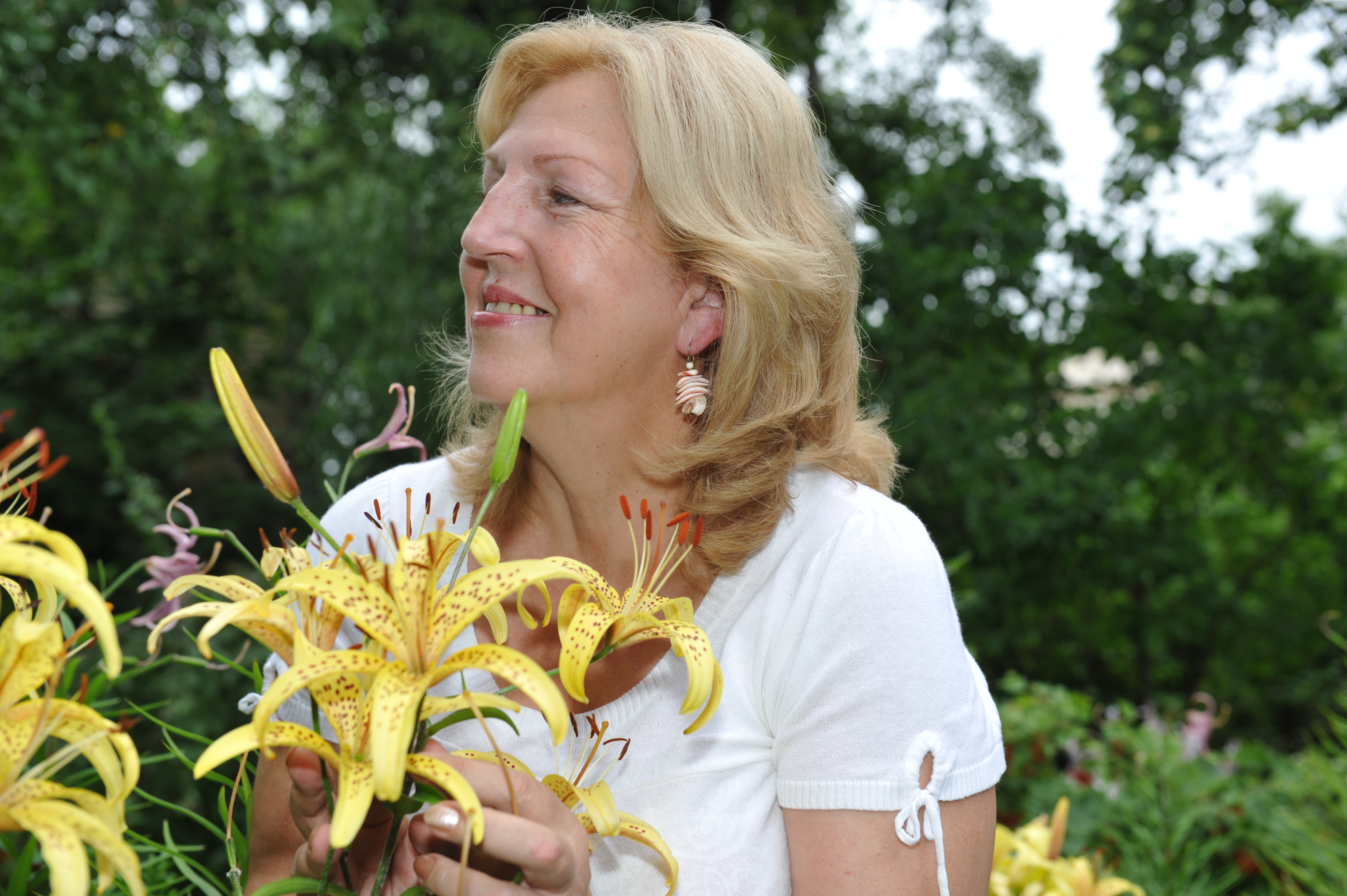
Zinta: Is it important to you to read other than Latvian literature? I have to say, in the United States, we tend to be
a tad ethnocentric in our literary tastes … we read predominantly American literature, and I think that’s a shame.
Every culture has a unique perspective to offer, a different way of looking at the world that can enrich all of us. I have
found quite the opposite in Europe—a greater interest in reading across international borders. Who are some of your
favorite authors, and what authors have influenced your own work? Of what importance has reading the literature of other cultures
been to you, especially during the Soviet occupation of Latvia?
Vai tev svarīgi lasīt arī
citu valodu literatūru? Jāatzīstas, ASV mēs esam mazliet etnocentriski savās literārās
tieksmēs … mēs lasām pārsvarā tikai amerikāņu literatūru, un man liekas, ka
to var tikai nožēlot. Katrai kultūrai sava perspektīva, atšķirīgs skats uz pasauli, ar
kādu iepazīties var tikai mums visiem nākt par labu. Eiropā liekas pilnīgi otrādi, daudz vairāk
lasa arī citās valodās, citu zemju literatūru. Kādi tavi mīļākie autori un kuri tevi
ietekmējuši? Kāda nozīme tev bijusi lasīt citu valodu literatūru, it sevišķi padomju
laikos?
Laimdota: Esmu izaugusi ar Rietumeiropas klasisko literatūru. Mani vecvecāki un mamma bija kaislīgi lasītāji
un, neraugoties uz padomju režīmu, arī okupācijas gados iznāca ļoti daudz labu grāmatu.
Manus priekšstatus par pasauli ārpus redzamajām robežām veidoja Čārlza Dikensa, Henrija
Fīldinga, Džona Golsvērzija, Herberta Velsa, Viktora Igo, Onorē de Balzaka, Mopasāna, Aleksandra
Dimā, Žila Verna, Tomasa un Heinriha Mannu, Ē.M. Remarka, Ēriha KŁestnera, Selmas Lāgerlēvas u.c. romāni un stāsti. No amerikāņu
autoriem pirmo iepazinu Teodoru Dreizeru, vēlāk nāca lieliskie fantasti – Rejs Bredberijs, Harijs Harisons
un citi. Pateikšu tā: ja nebūtu bijis šo grāmatu, es būtu kā akla un kurla, es, aiz „dzelzs
priekškara” dzīvojot, nezinātu par pasauli nenieka, jo TV līdz pat 90. gadu sākumam bija tikai
3 kanāli (2 Latvijas, 1 Maskavas), bet kinofilmas – lielākoties skaistas (cenzūras izgraizītas)
bildītes. To, kāda pirms padomju okupācijas bijusi Latvija un citas „padomju republikas”, es arī
uzzināju galvenokārt no grāmatām, un pat „padomiski orientētās” varēja lasīt
starp rindām. Lai gan šodien mums pieejama satelīttelevīzija ar neskaitāmiem kanāliem, interneta
bezdibeņi un, protams, iespējas ceļot, es joprojām lasu, cik vien laiks atļauj, lasu visas pasaules
literatūru – latviski, vāciski, krieviski un angliski. Varbūt man ir „lasīšanas atkatība”,
ko?
I’ve grown up on Western European
classical literature. My grandparents and my mother were avid readers, and, despite the Soviet rule, even during the years
of occupation many good books were published. My view on the world outside what I could see was molded by Charles Dickens,
Henry Fielding, John Galsworthy, Herbert Wells, Victor Hugo, Onore de Balzac, Maupassant, Alexander Dumas, Jules Verne, Thomas
and Henry Mann, E.M. Remarque, Erik Koestler, Selma Lagerloff, and other novels and stories. Of
American authors, I was first introduced to Theodor Dreiser, later the major science fiction writers—Ray Bradbury, Harry
Harrison, and others. I’ll say this: if it hadn’t been for these books, I would have been blind and deaf, living
behind the Iron Curtain, and I wouldn’t have known anything of the world, because TV until the beginning of the 90s
had only three channels (two Latvian and one from Moscow), but movies—for the most part, badly censured and choppy.
What Latvia had been like prior to the occupation, as well as other Soviet republics, I learned mostly from books, too, and
even in those censured by Soviets, one could learn to read between the lines. Even while today we can access satellite television
with unlimited channels, the bottomless Internet, and, of course, travel freely, I still read as much as time allows, and
I read world literature—in Latvian, German, Russian and English. Maybe I have declared reading independence, hm?
Zinta: At this point in your career, you work entirely as a freelance author. Something which I quite envy! One of your
ongoing projects has been another novel, serialized for a newspaper. Tell us about that work. How the offer came to you, how
you decided to accept it, and what connection it has brought to you with your readers.
Pašlaik strādā pilnīgi
neatkarīgi kā rakstniece. Jāatzīstas, ka esmu tīri greizsirdīga par to! Viens no taviem projektiem
bijis romāns turpinājumos kādai avīzei. Pastāsti par to. Kā saņēmi uzaicinājumu,
kā izvēlējies šo darbu un kā tas tapa, tāpat arī, kā tas tevi saistīja pie taviem
lasītājiem.
Laimdota: Būt neatkarīgai
rakstniecei ir gan skaisti, gan sūri, vēl jo vairāk globālās krīzes laikā, kas savus nagus
iecirtusi arī grāmatizdevniecībā. Skaisti – jo varu būt neatkarīga savos darbos un to
izvēlē. Sūri – jo jāmeklē tie, kam šos darbus vajag un kas par to maksā naudu. Taču
laikam esmu atradusi vidusceļu, par ko paldies Dievam. Patiešām, esmu sadarbojusies ar savas pilsētas
lielāko laikrakstu tādā veidā, ka viņi publicē manu romānu turpinājumos. Laikam jau
lasītājs, it īpaši, ja līdzekļu pietiek tikai viena laikraksta pasūtīšanai, vēlas
lasīt ko vairāk par dienas ziņām, kriminālo sleju un sludinājumiem. Ja romāns patīk,
tas motivē lasītāju vai nu pasūtīt laikrakstu, vai arī katru dienu to pirkt, kas savukārt
izdevīgi izdevējam. Atzīšos, ka pirmā piekrišana šādam projektam no manas puses bija
pamatīga avantūra... jo nekāda romāna vispār nebija! Es to rakstīju diendienā un, kad man
jautāja, kad tad beigās notiks, godīgi atbildēju, ka nezinu, ko tie mani varoņi galu galā sastrādās.
Tādā veidā varēju epizodēs iepīt pašus aktuālākos notikumus mūsu valstī
un pasaulē, vienu otru „skandāliņu”, piemēram, kā amorāli „onkuļi”
internetā uzmācas bērniem... Manuprāt šī aktuālā „šodienas piegarša”
lasītājiem patika, bet tie, kuri kādu laiku bija spiesti darīšanās izbraukt no pilsētas
vai valsts, bombardēja ar telefonzvaniem, lai uzzinātu, kas notiks romānā, kamēr viņu nebūs
mājāsJ
To be a freelance writer is both
beautiful and difficult, especially in such a time of world economic crisis, which has its talons in the publishing industry,
too. Beautiful—when one can choose work freely. Difficult—because one must find those who need one’s work
and who are willing to pay for it. But I seem to have found some middle ground, thank God. I
have been working with our city newspaper and they have been publishing my novel in chapters. It seems our readers want to
read something more than just the daily news, crime beat and classifieds, especially if a newspaper is all the reading material
they can afford. If they like the novel, they are motivated to subscribe to the paper, or buy a copy each day, which benefits
the publisher. I’ll admit, it was quite an adventure for me to accept the paper’s offer to write a novel in this
manner, because no such novel existed! I wrote it day by day, and when someone asked me what was going to happen next, I had
to answer honestly that I had no idea, whatever my heroes would decide. In this manner, I could weave in current events in
our country and worldwide, the occasional scandal, for instance, how pedophiles are using the Internet to lure children …
It seemed to me that readers liked this relevance to current events, but those who for some reason had to leave town on business,
bombarded us with telephone calls to find out what was happening in the novel, up until they returned home.
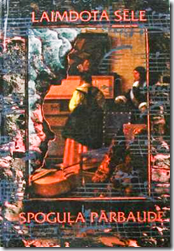
Zinta: What are you working on today? What novels
and poetry books are in your future plans?
Ko raksti šodien? Kādi nākotnes
plāni?
Laimdota: Pašlaik strādāju pie jauna romāna, kas būs mana paša pirmā prozas „bērna”
„Spoguļa pārbaude” turpinājums – pēc 20 gadiem. Nesen pabeidzu nelielu populārzinātnisku
darbu – lekciju kursu par dažādiem interesantiem aspektiem Eiropas un citu zemju tautu pasakās. Katru
mēnesi uzrakstu vairākas esejas žurnāliem par ezoteriskām tēmām, dažādiem atklājumiem
un pētījumiem.
Right now I am working on a new novel
that is going to be part two of my first novel, Spogula Parbaude—after 20 years. Recently, I finished a work analyzing
interesting aspects in European and other folk tales. Every month I write essays for magazines on various esoteric themes,
findings and research.
Zinta: Are you considering any trips overseas, perhaps? To America, maybe? We would love to have you visit us here and do
an author’s reading …
Varbūt esi domājusi par ceļošanu
uz Ameriku? Mēs ļoti gaidītu tādu autoru ciemos un lasījumu šeit…
Laimdota: Protams, esmu domājusi un turpinu domāt. Man ļoti patīk ceļot, un es patiešām
gribētu redzēt Ameriku „dzīvām acīm”, nevis tikai TV ekrānā. Man tā šķiet
valdzinoša, apbrīnojama zeme savā dažādībā un... vienotībā. Kā filmā
„Neatkarības diena”...
Of course, I have thought about it and
continue to think about it. I love to travel, and I really would love to see America with my own eyes, not just on a television
screen. It seems a fascinating place to me, awe-inspiring in its diversity and … its union. As in the film Independence
Day …
Zinta: Where, how can readers learn more about you? Have you considered developing a Web site about yourself and your growing
body of literature?
Kur un kā lasītāji varētu
vēl vairāk ar tevi un taviem darbiem iepazīties? Varbūt tiek gatavota kāda mājas lapa par tevi
un taviem darbiem?
Laimdota: Grūti atbildēt. Pagaidām man vēl nav savas mājaslapas, kaut gan draugi jau labu laiku
mudina tādu iekārtot. Jāgaida, kamēr kādam tulkotājam „iekritīs acīs”
kāda no manām grāmatām.
Hard to say. I don’t yet have my
own website, although my friends keep urging me to create one. I will have to wait and see, if my books will catch the eye
of some translator.
Zinta: Thank you so much, Laimdota, for sharing your time and yourself with
our readers. We anxiously await your books, and for those who may not read Latvian, translations!
Sirsnīgi pateicos, Laimdota, par tavu dalīšanos
ar sevi un ar saviem darbiem. Mēs ļoti gaidām turpmākos darbus kā arī tulkojumus tiem, kas latviski
lasīt neprot!
Read a review of Cert Zibens Marmale (Lightning Strikes the Sea).
|

